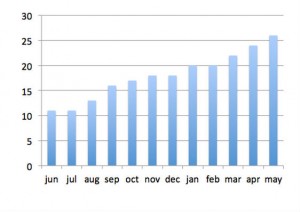— March 7, 2019
Determining whether to focus on short-term or long-term marketing (also known as transactional vs. relationship marketing) can be tough. However, when you’re building your marketing plan, it’s important to weigh the benefits of both forms. Commonly, marketers are drawn to short-term marketing tactics because they produce results quickly, justify spend immediately, and potentially lead to a salary bonus for the marketing department. However, without investment in long-term marketing, the brand may struggle, and the company may win the battle, but lose the war.
Short-term Marketing Defined
Short-term marketing is the process of using marketing tactics that produce revenue-centric outcomes nearly immediately. Examples of these outcomes are leads or purchases. These outcomes will follow your purchasing cycle. Generally, short-term marketing is a higher cost, has a more guaranteed return, but generally has a lower ROI. This is commonly referred to as transactional marketing as it usually leads to a sale in the short-term. With short-term marketing, there is a clearer path to ROI.
Long-term Marketing Defined
Long-term marketing is the process of using marketing tactics that produce non-revenue centric outcomes that have potential to pay off in the long run. Examples of these outcomes may be impressions, social engagements or blog reads. These tactics drive growth at the top of your funnel and usually take at least twice as long as your purchasing cycle to convert. Generally, long-term marketing is lower cost, has a less guaranteed return, but has the potential for higher ROI. This is commonly referred to as relationship marketing as it involves building a relationship with your clients. With long-term marketing, there is a less clear path to ROI.
Examples of Short-term Marketing Tactics
- Search Engine Marketing
- Lead Forms Advertisements on LinkedIn or Facebook
- Coupons/Promotion Codes
Examples of Long-term Marketing Tactics
- Search Engine Optimization
- Content Creation
- Social Media Organic
Examples of Tactics that Blur the Line
- Social Media Advertising
- Tradeshows
- Email Marketing
Should I Implement Short-term or Long-term Marketing?
When considering which tactic to use for your organization, consider the following:
- What are the company’s goals? The tactics you choose should align with what the company is working towards in the short and long-term.
- You may be drawn to the short-term tactics as it allows for instant gratification, but we recommend utilizing at least a few long-term tactics. The reality is, you’re trying to win the war and the battle – – which requires using both long-term and short-term marketing.
- Looking at what your competitors are doing can be beneficial. If you see them focusing on short-term tactics and not utilizing long-term tactics, this may be how you can beat them long-term.
- Who is your target market? Do some research into who you’re selling to, to see which tactics they will respond to.
- Have the short-term and long-term complement each other. Your marketing plan should strategically have specific tactics that compliment your other tactics. This works by using long-term marketing efforts to drive top of funnel leads and short-term marketing efforts to close them.
Originally published here.
Business & Finance Articles on Business 2 Community
(152)
Report Post







